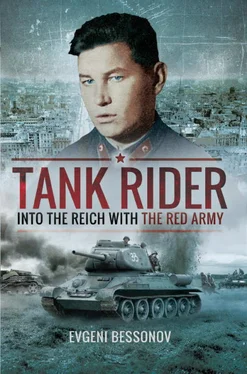The battalion was stationed in a village and stayed there for several days. Reinforcements arrived; these were soldiers drafted from liberated areas of Ukraine. The company received men well in their forties, who had only received basic training, and they were slow and timid. Besides that, they had never served in the army. Our company received twelve or fifteen such ‘warriors’.
The 3rd company, at that time it was the 2nd company, received men of different ages, including former partisans, who could handle weapons, all in civilian clothes. The same company got a new commander to replace Gulik, who had been killed – Senior Lieutenant Shtokolov. Lieutenant Mochalov arrived as the machine-gun platoon leader to replace the wounded Kolosov. At that time the machine-gun company as such did not exist, it did not have machine-guns either. It was Mochalov’s first time at the front, he was not used to army service and commanding other people, so he had a hard time on active service. Sometimes he merely wept, as he could not control his men.
After a brief rest the battalion received an order to advance and set up defences on the bank of Strypa river in the village of Dobropolie. Further to the west was the town of Bulach, where German reinforcements were starting to arrive. The Brigade was not capable of executing offensive operations. Its personnel was almost gone, almost all equipment was out of action. Out of 450 to 500 tanks of the 4th Tank Army at the beginning of the operation, the entire army only had around 60 vehicles, all with some kind of breakdown. However, we could still hold defences against the enemy that was also weakened, and we had to hold out until the infantry units of the Front arrived. The Tank Armies lost contact with them and were at a significant distance from the front units (50 or 60 kilometres).
My company and I were transferred to the other, western, bank of the Strypa river; we dug in to the west of Dobropolie village. The village was small – no more than thirty houses, I believe. The terrain on this bank of the river was less defensible than on the eastern side, but that was the order. I sent an outpost to the nearest hill in order to get early warning in case the Germans appeared. When in a defensive position, I always appointed observers both during the day and during the night – that was necessary at the front. The bad thing was that I did not have binoculars: although I did not like having them with me as they were very uncomfortable, especially during assaults.
The company lived on food provided by villagers, as the battalion kitchen was not there. Many villagers abandoned their houses – the old people remembered the fighting of 1914–1916 – the Russian Army under General Brusilov had defended the area, so they said. Villagers took their cattle with them, leaving chicken and other poultry behind. This is why we mostly ate poultry – soldiers could cook very well and even baked doughnuts with sugar, as there was plenty of sugar in the village. We dug trenches on the edge of the village and had several days of quiet rest and sleep in the huts. The sun was already hot, by 12 or 14 April, 1944, it was already nice and warm weather, while we were still in our winter uniforms.
Somewhere is a small ravine where we would take off our shirts and fight ‘German submachine-gunners’, as soldiers at the front called body lice. We squashed the damned bugs with our fingernails, shook our shirts out above a fire, but it rarely helped – lice lived very well in the warmth. I had a sweater and in almost every stitch lived a parasite bug. I burned the sweater; lice snapped loudly in the fire. It is shameful to write about it with such sincerity, but what can you do – it was war and as a mobile unit, we did not have a chance to wash in the field bathhouse or change our underwear from January 1944. We slept and rested in warm clothes for at least four months, in wintertime anywhere at all: in foxholes, on tanks, in huts – all the time without taking our clothes off. This is why we could not maintain a good level of personal hygiene. I do not think that I should blame anyone for this, as we were all the time deep behind enemy lines. It was only after we disengaged, that we received new summer uniforms. It wasn’t a problem in any of our other operations.
On one of those days Captain Belan (after the war and graduation from a military academy, he served as chief of traffic police in Moscow), chief of staff of our battalion, arrived along with our company commander Lieutenant Chernyshov, who had been missing for over a week. Lieutenant Chernyshov right away started to give orders, saying that this and that was wrong. I answered him with ‘F**k off’. Captain Belan stopped our quarrel, but I said that Chernyshov was picking on me. I said that if he had not been missing for a week and had arrived on time, he could have given all kinds of orders. I said that I had marched 30 kilometres in one-and-a-half days just to catch up with our battalion, and hadn’t been living with a young village girl. Belan did not reply, but gave me an order – to take a squad of strong guys and reconnoitre the village that was some 3 or 4 kilometres from us (I think this place was Bulach). I was to find out the enemy’s strength and report back.
Going on a scout mission in daytime in the open field, sinking in a muddy ploughed field, where bushes did not have leaves and wheat was not high, was a hard task. It was practically a suicide mission – Germans could merely shoot us down in the field or try to take us prisoners. Even without a reconnaissance we knew that the Germans occupied the village in front of us the day before – day and night we heard noise of the tank and truck engines from the village. But I had my orders and I had to fulfil them, as I did not receive any counterorders. I took two or three physically strong soldiers, and my binoculars, and off we went. It was fortunate that there was a ravine and we advanced 1 or 1.5 kilometres in it. It was a hard walk in the ravine, we could barely pull our feet out from the mud; we reached a hill, lay down on a dry spot and started to examine the surrounding area. Inspecting the terrain through the binoculars, I noticed a column of trucks and APCs advancing on the road to the right of us towards our defences, a little bit to the right of the battalion. To the left of us, less than a kilometre distant on the neighbouring hill, we spotted an armoured personnel carrier and several trucks, apparently carrying infantry. The Germans slowly advanced towards our village. It did not make any sense to stay there any longer and we went back secretly to our lines. At one place we had to abandon the ravine and we were in the sight of the Germans that marched to the left of us on the top of the hill. However, they did not open fire, although they could easily have cut us all down from the APC, even more so when a Tiger tank joined them later. We could not run – we did not have any energy left. Even now I do not understand, why they did not kill us, when we barely dragged our feet across the ploughed field in some 250 to 300 metres from them.
Upon my return I reported to Belan what I had seen and pointed at the German unit that was some 300 metres from our line of defence. The Germans quietly stood there, without opening fire. Captain Belan did not say anything, but it seemed to me that he was upset about something. But what? With me coming back alive with all soldiers? But we did make it back, and Captain Belan reported to the Brigade HQ about the large column of German troops that moved to the right from our battalion and a small group of Germans to the left of us. Captain Belan went off to the battalion HQ to the other side of the river, taking Chernyshov with him, ordering me to stay in the trenches with the untrained soldiers on the western bank of the river.
Читать дальше












